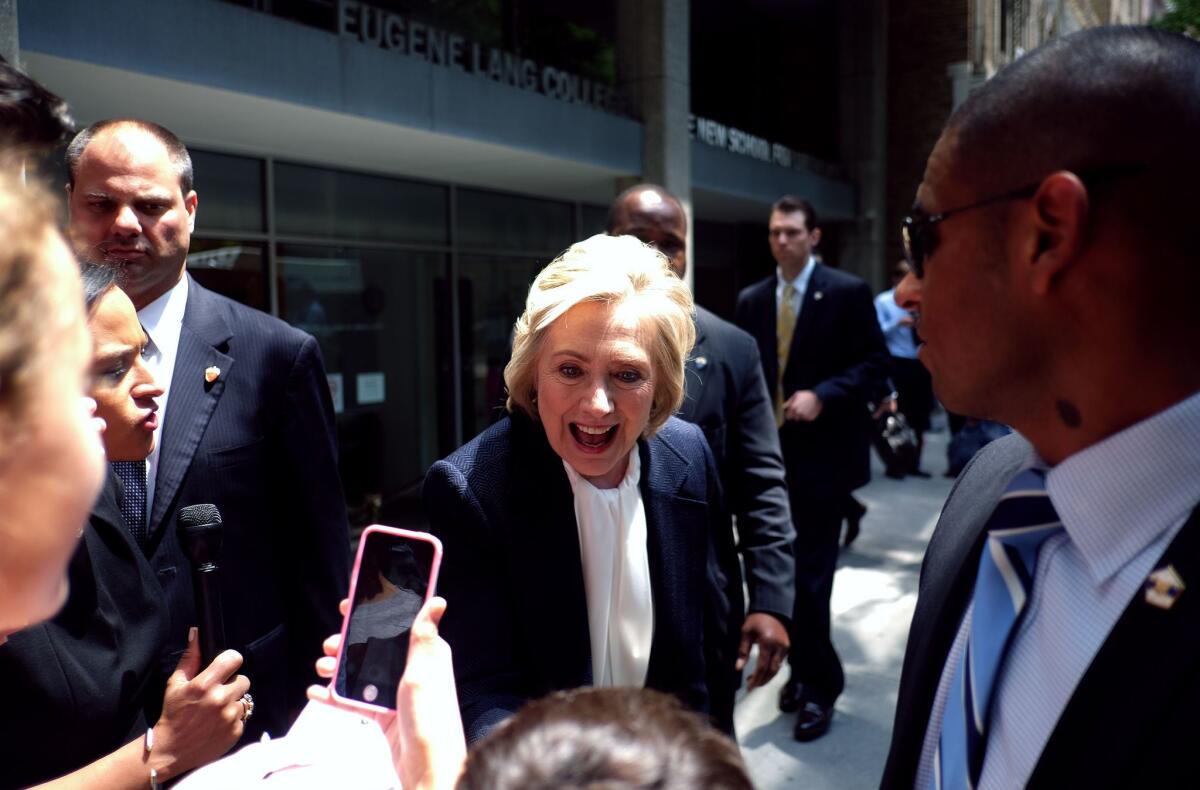The ‘gig economy’ gets the campaign treatment

Democratic presidential hopeful Hillary Rodham Clinton greets people in New York after outlining her economic vision in a speech.
- Share via
Reporting from Washington — Behind the talk of trickle-down economics and big government’s return, Republicans and Democrats used Hillary Rodham Clinton’s economic policy speech Monday to fight over something relatively new: Uber.
The gig economy – the sector of tech-enabled, contractor-dependent companies such as Uber, Lyft, TaskRabbit – is the new frontier in the economy and, thus, in fights over economic policy. The roles of government regulation, workers’ rights and benefits, unions and technology are all undecided and are topics that draw out clear partisan differences. As presidential campaign fodder, it doesn’t get much better than that.
“Many Americans are making extra money renting out a small room, designing websites, selling products they design themselves at home, or even driving their own car,” Clinton said in her speech at the New School in New York. “This on-demand, or so-called ‘gig economy,’ is creating exciting economies and unleashing innovation. But it is also raising hard questions about workplace protections and what a good job will look like in the future.”
Republican Jeb Bush’s camp cast Clinton as so 20th century.
“Americans want to work and want the opportunity to achieve earned success for their families, but Secretary Clinton’s antiquated proposals protect the special interests that want to stifle American ingenuity and 21st-century companies like Uber that are creating jobs,” said spokeswoman Allie Brandenburger. “Gov. Bush believes harnessing innovation and fostering technology can help us grow at 4% once again.”
It’s little surprise that Bush zeroed in on the Uber reference. For Republicans, the gig economy, also called the sharing economy, represents a fresh opportunity to make a familiar case against government regulation and for free markets to a newly receptive audience. Uber – which is either a ride-sharing service or an largely unregulated taxi, depending on your point of view – has argued that its drivers are more like contractors than traditional employees and aren’t subject to the same potentially burdensome regulations. The business stands as proof that innovation left free of government intervention will create jobs and expand the economy, the case goes.
This defense of the sharing economy is a chance for the GOP to reach a new generation of urban, young, educated voters – not a group that has been especially receptive to deregulation messages in the past.
For Democrats, the picture is more complicated. On one hand, the party’s own young, urban and educated wing is, at least for now, also the primary participant in the sharing economy. Prominent Democrats, most notably former White House advisor David Plouffe, have gone to work for Uber and other companies.
Democrats have pointed to the rise of freelancing and independent contracting as evidence for the need for government programs, in healthcare and child care, that partially take on the role once occupied by employers.
But the model also raises questions on issues paramount to other parts of the party. Labor and progressives are deeply skeptical about undoing decades of victories on workers’ rights, safety and benefits.
“We want this stuff around for consumers, but we don’t want to undermine the rights that employees need for things like basic income and safety and health and unemployment insurance and workers compensation,” said Harvard labor law professor Benjamin Sachs. “I don’t think it’s an exaggeration to say that Uber and others are raising fundamental questions about what it means to be an employee in this economy. What will all these protections we’ve enacted since 1935 and before mean if we move to an economy defined by independent contractors? It is a good symbol for a debate about the future of the labor market.”
Sachs called the questions “existential” dilemmas about work, but they are fast becoming political ones as well.
On Thursday, Bush plans to visit Thumbtack, a service that connects local professionals – photographers, contractors, plumbers – with customers. He reportedly plans to take an Uber.
kathleen.hennessey@latimes.com
Twitter: @khennessey
More to Read
Get the L.A. Times Politics newsletter
Deeply reported insights into legislation, politics and policy from Sacramento, Washington and beyond. In your inbox twice per week.
You may occasionally receive promotional content from the Los Angeles Times.









